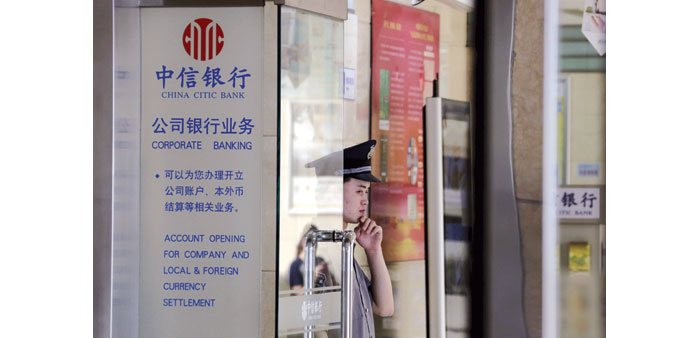A security guard stands at the door of a China Citic Bank in Beijing. A surge in Chinese cross-border technology and telecoms deals has helped mergers and acquisitions in Asia Pacific cross $1tn for the first time but mainland banks are missing out on the payoffs as they badly trail global rivals in advisory work.
Reuters
Hong Kong
A surge in Chinese cross-border technology and telecoms deals has helped mergers and acquisitions in Asia Pacific cross $1tn for the first time but mainland banks are missing out on the payoffs as they badly trail global rivals in advisory work.
While low fees have helped Chinese banks to win market share from US and European counterparts in stock offerings and loans, they figure nowhere among the 10 biggest M&A advisers by value of deals, Thomson Reuters data up to the end of November showed.
China’s biggest investment bank, CITIC Securities , ranked 11th, advising on $68.7bn worth of deals. The number of Chinese banks among the top 20 M&A advisers in the region fell to seven from eight and their market share slumped to 13.8% from 33.7% last year.
The Chinese banks’ struggles to emerge as leading advisers on big ticket acquisitions have curtailed their fee income growth at a time when the lending business is under pressure due to a slowing domestic economy.
“When Chinese companies go global, they will tend to call on banks and advisers who have global reach so there’s still a strong role for the international banks and advisers,” said Aga Guzewska-Radzka, consultant at Accenture Strategy in Hong Kong.
A push by Chinese state-owned enterprises and private companies to buy assets abroad and the massive restructuring of the region’s biggest conglomerates are driving the deal-making boom. The trend is expected to continue, bankers say.
Top deals in 2015 include the $33.7bn combination of assets of China’s three main telecom operators as well as the $15.4bn purchase of British mobile phone company O2 by Li Ka-shing’s Hutchison Whampoa.
Chinese firms tend to advise on domestic deals, where they have relationships on both sides of transactions, but that’s less likely in cross-border acquisitions. They also have fared better than international rivals in financing M&A deals, where they have won business with cheaper funding because of their sizeable balance sheets, but that’s not the case for merger advice.
“They can’t compete on fees there,” said the head of M&A at a global investment bank who couldn’t be named discussing the industry.
Semiconductor, Internet and telecoms transactions have accounted for about a quarter of M&A deal value this year, a sector so far dominated by global firms such as Goldman Sachs and Morgan Stanley. In order to win more cross-border deals, Chinese banks are adopting several tactics. CITIC Securities, for instance, appointed Italian banker Federico Bazzoni, formerly at Bear Stearns, to originate deals in Europe, Middle East and Africa.
Haitong Securities, China’s second-largest brokerage, completed in October the purchase of the investment banking arm of Portugal’s Novo Banco to use it as a platform for global expansion.
Some Chinese securities firms are also teaming up with European law firms to help source potential acquisition targets for mainland suitors, according to a source with direct knowledge of the tie-ups who was not authorized to discuss them publicly.
Despite the jump in deal activity to a record $1.1tn, estimated fees fell 1.8% to $3.7bn according to Thomson Reuters/Freeman Consulting Co, reflecting an increase in less lucrative corporate restructurings. Activity in Asia still accounted for just 21% of global value, compared with nearly 50% for deals in the Americas region.
“Where the biggest fees are going to be made are in the complex, cross-border deals where banks that understand the situation across different jurisdictions and geographies are needed,” said John Kim, head of M&A for Asia ex-Japan at Goldman Sachs.

